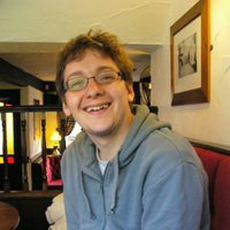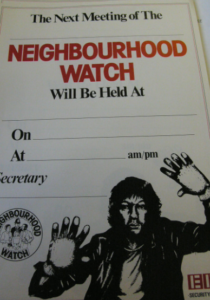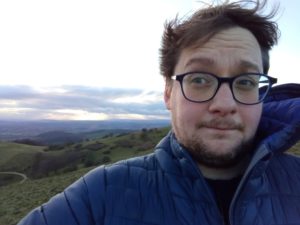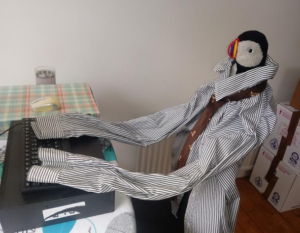 1. What is your role within the History department? I am a Senior Lecturer in Modern History. I mainly teach and research Contemporary British History although I am also interested in global histories of activism. I also edit the journal Contemporary British History. In the past I have been the School’s Academic Integrity Officer and the Director of the Modern British Studies Centre. One of these jobs was way more fun than the other.
1. What is your role within the History department? I am a Senior Lecturer in Modern History. I mainly teach and research Contemporary British History although I am also interested in global histories of activism. I also edit the journal Contemporary British History. In the past I have been the School’s Academic Integrity Officer and the Director of the Modern British Studies Centre. One of these jobs was way more fun than the other.
2. What are your research interests? I work on histories of activism in the twentieth century. I started off researching civil liberties and human rights activism within the UK but now work on forms of extra-parliamentary conservatism. I am interested in what political history looks like outside of its usual channels.
3. Where did you study (UG, PGT, PGR etc.)? Here at the University of Birmingham. I worked at the University of Warwick for a short time, but Birmingham decided it couldn’t cope without me and coaxed me back.
4. Did you always know you wanted to go to university or in to academia? While I was at school, I vaguely wanted to go to University, but very nearly didn’t study history at all. I didn’t really aspire to go into academia, but I liked reading, writing and talking about the past with people.
5. How long did it take and how did you manage to fund and complete your PhD? I was funded by the Economic and Social Research Council which awarded me MA funding for one year and then PhD funding after that. The PhD took three years.
6. What was your PhD on? It was on the history of the National Council for Civil Liberties (now the pressure group the Liberty) and the political culture of civil liberties activism from the 1930s until the 1980s. I reworked this a fair bit, expanded its chronology for my book Civil Liberties and Human Rights in Twentieth Century Britain.
7. What are you working on at the moment?

I am writing a second book on forms of extra-parliamentary conservatism from the 1960s onwards. This stretches from the seemingly dull (small business activism or campaigners on behalf of the self-employed), to seemingly cranky (shed-based letter-writers, campaigners against the contraceptive pill) and some in the mainstream (Crimestoppers or Neighbourhood Watch). A surprising number of the people I have studied are UFO enthusiasts.
I am also interested in the relationship between the history of emotions and activism/politics. As far as possible (and fair) I try to embed my research interests in my teaching which I try to see as an opportunity to engage in collective, intellectual problem-solving.
8. What made you want to become a lecturer/academic? I always liked writing and was looking for opportunities to do this as my degree progressed. As an undergraduate, I also began to enjoy spending times in archives and finding things out for myself. My Mum worked in the voluntary sector in my hometown of York providing guidance, advice and counselling for young people between the ages of 16-24 and my Dad was a teacher. Sometimes I think my job blends these things together.
9. Name three books/films/podcasts you recommend to read/watch/listen to during lockdown. I think the lockdown is a good time to read some fiction. I recommend in Our Mad and Furious City by Guy Gunaratne and Mohsin Hamid’s Exit West as bracing, challenging, reads about the contemporary world.
A documentary to watch: Fire in Babylon about the West Indies Cricket team of the 1970s and 1980s and I have appreciated all three series of the podcast Slow Burn.
As for television, I recommend watching All Aboard! The Great Reindeer Migration, a film of reindeers trekking, slowly, across the Arctic. The four-hour, edited version is fine but you could also watch the 168 hour slow television version. It has zero named characters and no dialogue. But what it lacks in, you know, things happening, it more than makes up for in subtle, beautiful, changes in Arctic light, a bobbing herd of hardy creatures, and the gentle, percussive sound of reindeer footfall padding across the snow. Perfect for a soothing lockdown experience. Though it may be cold and the destination may be far, stroll on reindeers, stroll on.
10. What is the most historically inaccurate film or scene you have watched or read? Bladerunner is set in November 2019. How was your November?

11. Are you staying physically active during lockdown? If so, how, and do you suggest anything? I live near the Malvern Hills. There is pretty much one activity here – go up the hills. So I have been up and down the hills a fair bit. I’m trying to get better at birdwatching.

12. Do you have any pets? If so, what? (Pictures encouraged!)
No. Although a terrifying co-worker did appear at one point during the lockdown. I managed to take a quick picture.
13. What is your favourite film or TV series? The Sopranos, Match of the Day, Spaced, Bojack Horseman and, as you will note from above, All Aboard! The Great Reindeer Migration.
14. Do you have a favourite band/album/genre of music? If so, what? I listened to a new, different album on every single commute to work through 2019 and shared the experience with a largely ambivalent Twitter. It was a good thing. It got me out of my comfort zone and meant I had lots of conversations with colleagues about a much wider range of diverse music than I often listen to. I like all sorts of music and encourage anyone reading this try as many of Birmingham’s music venues as possible when they get back up and running safely. In particular, the Hare and Hounds in King’s Heath and Supersonic Festival are both vital to what makes Bham great.
I decided I needed an answer to the favourite album question: I See a Darkness by Bonnie Prince Billy.
15. Do you have any unusual links or claims to fame? Quite niche, but I used to be in a band with Dubstep producer Rusko.
16. What skill would you one day like to master? Listening (to be clear, I can do this, but mastering listening would be handy for oral history).
17. What takes up too much of your time? Worrying.
18. What songs have you completely memorized? I know every single word from the entire Dirty Three album Horse Stories and can sing it note perfect on demand.
19. What advice would you give to your younger self? Keep your friends close but – and I cannot stress this enough – your enemies much, much further away. In fact, where possible, minimize the cultivation of enemies.
20. Do you have any top tips for academic work/study for our students? Getting stuck can be good. It can mean you are onto something. When you get stuck, try and work out why, what this means as specifically as possible and then you can start digging, untangling and working out what to say.
